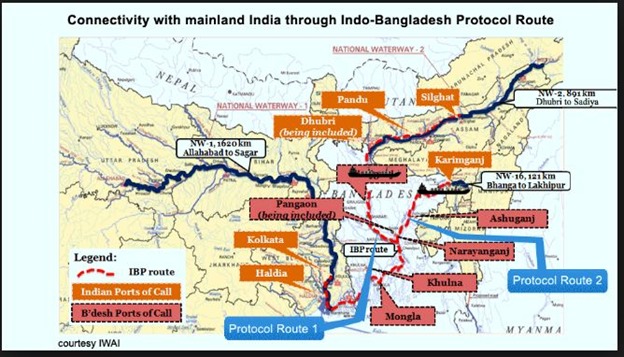
New Indo-Bangla river route opens Sept 3

Bangladesh and India are set to open a new chapter in bilateral connectivity from next month by opening a new inland waterway that would boost trade, reduce transportation costs and improve connectivity to India’s northeastern states.
The new riverine trade route connecting Sonamura in Tripura to Daudkandi, Cumilla in Bangladesh will become operationalised on September 3, when a Bangladeshi vessel will transport a cargo of cement to Tripura as part of the efforts to boost connectivity between the two countries.
The decision to launch the new route from September 3 was finalised during the visit of Indian Foreign Secretary Harsh Bardhan Shringla on August 18-19 when he met State Minister for Shipping Khalid Mahmud Chowdhury. Shringla also called on Prime Minister Sheikh Hasina.
Earlier in May, the two sides signed the addendum to the Protocol on Inland Water Transitand Trade (PIWTT). The number of Indo-Bangladesh Protocol (IBP) routes was increased from eight to ten. These include the Sonamura- Daudkhandi stretch of Gumti River and the opening of the Rajshahi-Dhulian-Rajshahi routes with an extension up to Aricha.
With the Second Addendum to PIWTT, two new protocol routes, five new Ports of Call and two Extended Ports of Call have been added. This takes the number of protocol routes to 10, ports of call to 11, extended ports of call to two.
Diplomatic sources in Dhaka and New Delhi said the operationalisation of the new protocol route will greatly facilitate bilateral trade, with improved reliability and cost-effectiveness for the business community and the people of both the countries.
Bangladeshi vessel MV Premier will carry 50 tonnes of cement from Premier Cement Ltd of Bangladesh to Tripura via Gumti River, officials said, adding that the customs formalities will be completed at the land customs station at Srimantapur-Bibirbazar.
According to a survey conducted by the Bangladesh authorities, 89.5 kilometres out of 90 km of the Sonamura-Daudkandi protocol route falls in Bangladesh and 500 metres in India.
Earlier, a floating jetty on Gumti River was launched as part of the Indo-Bangladesh international inland waterways project. Small boats having the capacity to carry 50 tonnes of goods would start moving through this route to Bangladesh with the setting up of a temporary jetty soon.
“The new route will facilitate bilateral trade with improved reliability and cost-effectiveness for the business community,” officials said.
Bangladesh and India signed the Protocol for Inland Water Trade and Transit in 1972 for inland waterways connectivity between the two sides for bilateral trade and to improve connectivity to India’s north-eastern states.
The protocol was expanded with the signing of a second addendum on May 20, 2010, that added two new routes and five ports of call to takes the total number of routes to 10 and ports of call to 11.
Official sources said during 2019-20 fiscal, around 3.5 million metric tonnes of cargo were transported via the inland waterways by the two countries.
The Sonamura-Daudkhandi route will improve the connectivity of Tripura and adjoining states. The Rajshahi-Dhulian route will augment infrastructure in Bangladesh and reduce transportation cost of stone chips to Bangladesh.
Among the newly added ports of call, Dhulian, Maia, Kolaghat, Sonamura and Jogigopha are on the Indian side while Rajshahi, Sultanganj, Chilmari, Daudkandi and Bahadurabad are on the Bangladesh side.
Meanwhile, two more extended Ports of Call – Tribeli (Bandel) and Badarpur on the Indian side and Ghorasal and Muktarpur on Bangladesh side – have been included through this addendum. With this, the total number of ports of call is now eleven and two extended Ports of Call in both the countries.
Inclusion of Jogigopha in India and Bahadurabad in Bangladesh as new Port of Call will provide connectivity to Meghalaya, Assam and Bhutan. Currently, there are six ports of call each in Bangladesh and India.
The two countries have also agreed to introduce trade between Chilmari in Bangladesh and Dhubri in India through the use of shallow draft mechanized vessels. This initiative will allow export of stone chips and other Bhutanese and North East cargo to Bangladesh and easy access for the traders to the hinterland of Bangladesh.
The agreement will allow Inland vessels of both the countries to ply on the designated protocol route and dock at Ports of Call in each country, notified for loading and unloading of cargo. It will help boost bilateral trade and connectivity between the two countries.
Editor & Publisher: S. M. Mesbah Uddin
Published by the Editor from House-45,
Road-3, Section-12, Pallabi, Mirpur
Dhaka-1216, Bangladesh
Call: +01713180024 & 0167 538 3357
News & Commercial Office :
Phone: 096 9612 7234 & 096 1175 5298
e-mail: financialpostbd@gmail.com
HAC & Marketing (Advertisement)
Call: 01616 521 297
e-mail: tdfpad@gmail.com